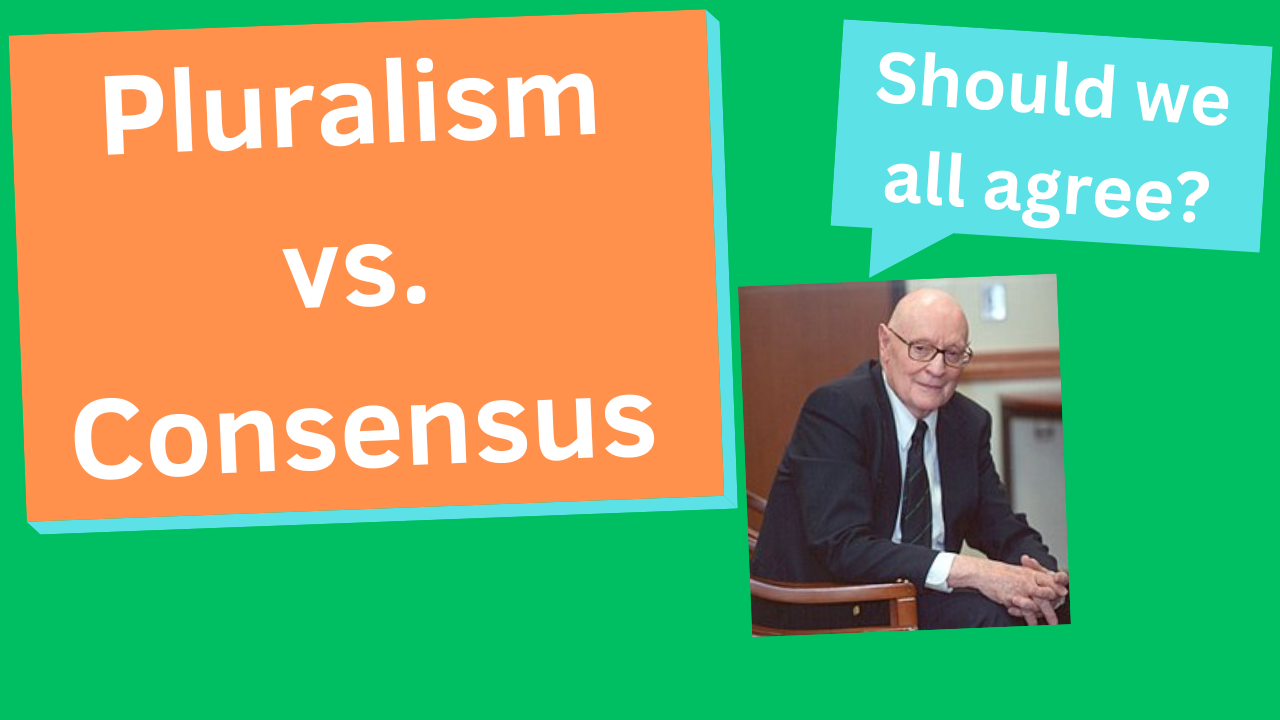03/27/2024 – Pluralism vs. Consensus

Do we all need to agree on truth? Or do we all need to agree in order to have a good society? Or, maybe it just doesn’t matter. Perhaps pluralism is better than consensus. Check this out. This is TenOnReligion.
Hey peeps, it’s Dr. B. with TenOnReligion. If you like religion and philosophy content one thing I really need you to do is to smash that sub button because it really helps out the channel. The transcripts are available at TenOnReligion.com and new episodes are posted about every two weeks, around noon, U.S. Pacific time, so drop me some views.
Today we’re going to present an argument against the idea that consensus is necessary for a functioning society. This is based on a philosopher named Nicholas Rescher and his book Pluralism: Against the Demand for Consensus. This book is entirely a philosophical book and as you know a lot of what I present here on this channel relates to religion (the channel’s name is TenOnReligion after all), so I’m still thinking about what the implications of this book are for religion, but maybe I’ll offer a few thoughts about this a little later. We’ll see. Anywho, let’s present the philosophical argument first and then see what happens. Let’s get started.
Rescher starts out by stating that consensus can prevail in three different areas: theoretical or cognitive (meaning belief), practical or pragmatic (meaning action), and evaluative or axiological (meaning value). Consensus means we agree. Dissensus means we don’t agree. Basically, a consensualist focuses on dissensus avoidance while a pluralist focuses on dissensus management. Despite what a lot of people think, consensuality is not really directed to reason or rationality. We can’t just reason our way into consensus or get others to think the same way we do. It’s more complicated than that because of all the psychological aspects of trying to convince an individual or group of people about something. Also, consensus can be good or bad. What people agree on can be something evil or stupid as well as something that is kind or wise. A thousand people can be just as wrong-headed as a single individual. There is also a difference between respecting someone and agreeing with them. To respect another person is more than merely tolerating them. For example, the next time you have a disagreement with your best friend or buddy tell them “I just want you to know, I tolerate you,” and see how they respond. Respect is not toleration, rather it is to see them as entities of worth and bearers of rights and entitlements in view of their shared status as rational creatures.
Here’s an interesting statement from Rescher. Consensus is not required in the pursuit of truth. Not even for science. The “scientific truth” that we discover about the world is our truth, not so much in the sense that we make it up, but rather in the sense that it reflects our technologically available modes of interaction with nature. Also, the entire nature of science is that it progresses. It doesn’t matter however much consensus may exist at any one particular time, there is certainly no transtemporal agreement or diachronic consensus. Many of the scientific “truths” of 50 or 100 years ago are different today. Science is empirically based on our experience. Its results emerge from the reactions of individual agents proceeding on the basis of their personalized backgrounds of experience. Pluralism is unavoidable because of the pluralism of human experience. Even if we detect everything we can, given our interests and sensibilities, we will not have gotten a hold of everything available to others, even regarding the same objects. The sameness of the object of contemplation does nothing to guarantee the sameness of ideas about it. Very different constructions are often placed upon “the same” occurrences. Given the diversity of human experience, empiricism entails pluralism. The experiential diversity of differently-situated rational inquirers must mean that they are destined to reach variant conclusions about the nature of things.
Alright, let’s get into some nuts and bolts here about pluralism. There are four different reactions to pluralism. One, skepticism. No single position is justified and all the alternatives simply cancel one another out. Two, syncretism. All of the alternatives should be accepted. All of those seemingly discordant positions are in fact justified and they must, somehow, be joined and put together. Three, indifferentist relativism. Only one alternative should be accepted, but this acceptance is not based on rationally persuasive grounds, but rather as a matter of taste or social tradition. Four, perspectival rationalism or contextualism. Only one alternative should be accepted based on rationality, but this may differ perspectivally from group to group, era to era, or from school to school. Skepticism is rejected because it doesn’t answer any of our questions or provide information about the world. Syncretism is also rejected because it’s impossible to put everything together when some ideas or positions are logically contradictory to one another. Indifferentist relativism is rejected because it assumes that all perspectives are roughly equal and acceptable and that there is no rational basis for choosing one over another so choices are made on non-rational grounds such as taste or custom. But this is false and obviously not the case because there are rational ways of choosing. The fourth position of perspectival rationalism or contextualism is accepted. Let’s talk about this for another minute.
Now let’s talk about communication, which has been a big issue over the past few years with all of the intentional miscommunication going on in the media, and let’s just hit the nail on the head here. What people take away from communicative interactions is not what speakers declare or intend to say, but what hearers are able to take away from inference largely on the basis of suppositions that they themselves bring to the communicative context. Yeah. Get this. Agreements and disagreements can occur on four levels. On theses or simple statements. The claims or facts of the matter. On reasons or what counts as evidence. This is often the case. On standards, or the ways and means of weighing evidence. And on objectives which are the ultimate purposes by which the bearing of standards and reasons upon the evaluative issues are determined. The deeper the level at which dissonance and disagreement occurs, the less we see the other person or group as proceeding rationally. This is why, for example, politics in many countries can be deeply divided. Rescher, this is good stuff.
Lastly, what about social order? Is consensus required? Rescher asserts that dissonance and diversity is perfectly acceptable as long as it is restrained to a point well short of outright conflict and chaos. Acquiescence is the key concept here. Mutual restraint is better than the alternative of actual conflict or war, which will lead to a worse situation. It’s sort of a cost-benefit analysis in a convergence of interests with the interests being a peaceful social order. A peaceful, reciprocal acquiescence in a pluralistic community of conflicting views creates a situation in which each party is content to accept a diversity that affords them the benefit of pursuing their own projects at the cost of giving a similar privilege to others. Which is a better use of one’s time, energy, and resources – fighting a war or doing what you want to do in your life? People who block social accommodation by holding out stubbornly against generally acceptable compromises lose friends, undermine trust, destroy sympathy, and in the process undercut their prospects of prevailing, either in the present situation, or on future occasions. Consensus-seeking societies will aim to maximize the number of people who approve of what is being done whereas acquiescence-seeking societies seek to minimize the number of people who disapprove very strongly of what is being done. The important thing is not to strive for consensus, but to try and create conditions of interaction where people can flourish despite a lack of consensus.
Now the one major critique of this view is that the limits of acquiescence are finite. People will only acquiesce in injustice up to a certain point. After that they turn to non-cooperation or even outright opposition. They take up arms against the issues or, if they can, perhaps simply leave. With that in mind I’m not sure Rescher in this book fully considers the effects of power inequality among various groups in a pluralistic society which is created and made worse by a capitalistic society. So, can and should we live with dissensus and diversity? Of course. Should we more often than not possess an attitude of “live and let live?” Absolutely. But should we allow ourselves to constantly be taken advantage of or be exploited? Where is the line drawn on these kind of issues? Rescher doesn’t really say.
And now about religion… There is the agreement or disagreement internally within traditions and sub-traditions and a lot of that is historically political in nature such as the Sunni/Shia divide in Islam, or the Orthodox/Catholic divide in Christianity. Then there is the agreement or disagreement externally between different religious traditions and a lot of that is also historically political in nature such as Hinduism and Islam in India; or Judaism, Christianity, and Islam in Israel over the past few millennia. I guess because religions often perceive their claims about society, the individual person, the world, and even the universe with the idea that eternal issues are at stake, so they are less likely to “acquiesce” to any views different from their own. So as long as leaders convince their people that a political event really has a religious backing, as in this is God’s will, this is our destiny, this is the way, it doesn’t really seem like pluralism will be an easy pill for many religious adherents to swallow. But it should be. And with that, we’re done.
So, what do you think about pluralism vs. consensus? Should we all agree? Is it necessary for a good society? Or, are there many cases in which it just doesn’t matter all that much to have a functioning society? Leave a comment below and let me know what you think. Until next time, stay curious. If you enjoyed this, support the channel in the link below, please like and share this video and subscribe to this channel. This is TenOnReligion.


